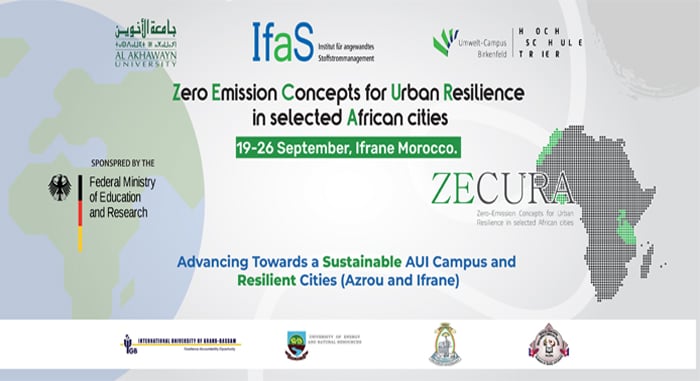
Al Akhawayn University (AUI) in Ifrane, Morocco, is joining forces with five other German and African higher education institutions to tackle the most serious climate change and sustainability issues currently facing the continent.
From 19th to 26th September 2023, over 25 AUI students from study disciplines including science, engineering, business, social sciences and the humanities will welcome fellow students from Trier University of Applied Sciences to collaborate in Ifrane on the latest ‘Zero Emission Concept’ solutions.
The initiative is part of the ‘Zero-Emission Campus Resilience Advancement (ZECURA) project, which is additionally supported by Gulu University (GU) in Uganda; The Nelson Mandela African Institution of Science and Technology in Tanzania; University of Energy and Natural Resources in Ghana, and the International University of Grand-Bassam in Côte d'Ivoire.
Now students are preparing to focus on strengthening sustainability efforts that will contribute to Morocco's renewable energy strategy targets for 2030, which include doubling the country’s renewable capacity to 12 gigawatts – enough energy to power almost every home in Morocco.
El Asli Abdelghani, Professor of Biology in the School of Science and Engineering at AUI, comments: “We are thrilled to be taking the lead with our partners on this latest ‘net zero challenge,’ which will involve our students, academics and business supporters in challenges that will help revolutionize energy, water and waste management across Morocco and bring other benefits to Africa. Our immediate goal is to develop a comprehensive zero-emission strategy for AUI, where we are already making huge strides by producing up to 51% of our own thermal energy using olive pits, alongside new initiatives in green hydrogen research. The next steps will be to extend these and other sustainable solutions to benefit communities in cities including Ifrane and Azrou. The results of our joint research and future plans will be unveiled on Tuesday, September 26th. AUI’s commitment to this project emphasizes our determination to combat climate change and align with other impactful research in bioenergy, smart-grid technologies and sustainable development.”
Africa has the fastest urbanization rate in the world and by 2050, 14 African cities will be home to more than 10 million inhabitants. Urban communities are faced with limited resources, inadequate infrastructure and uncertain life prospects.
ZECURA aims to contribute to developing and implementing key sustainable strategies to deal with current and future challenges, improving the lives of people and helping businesses grow sustainably.
This initiative is funded by the Federal Ministry of Education and Research in Germany and coordinated by the Institute for Applied Material Flow Management.
